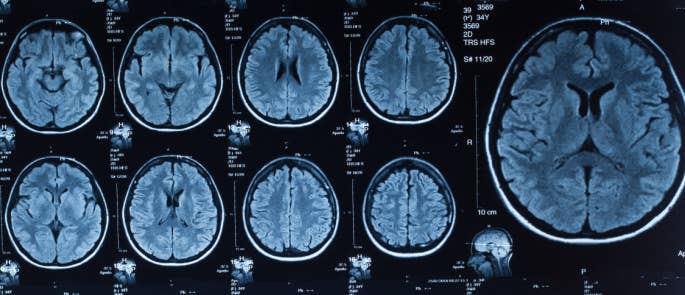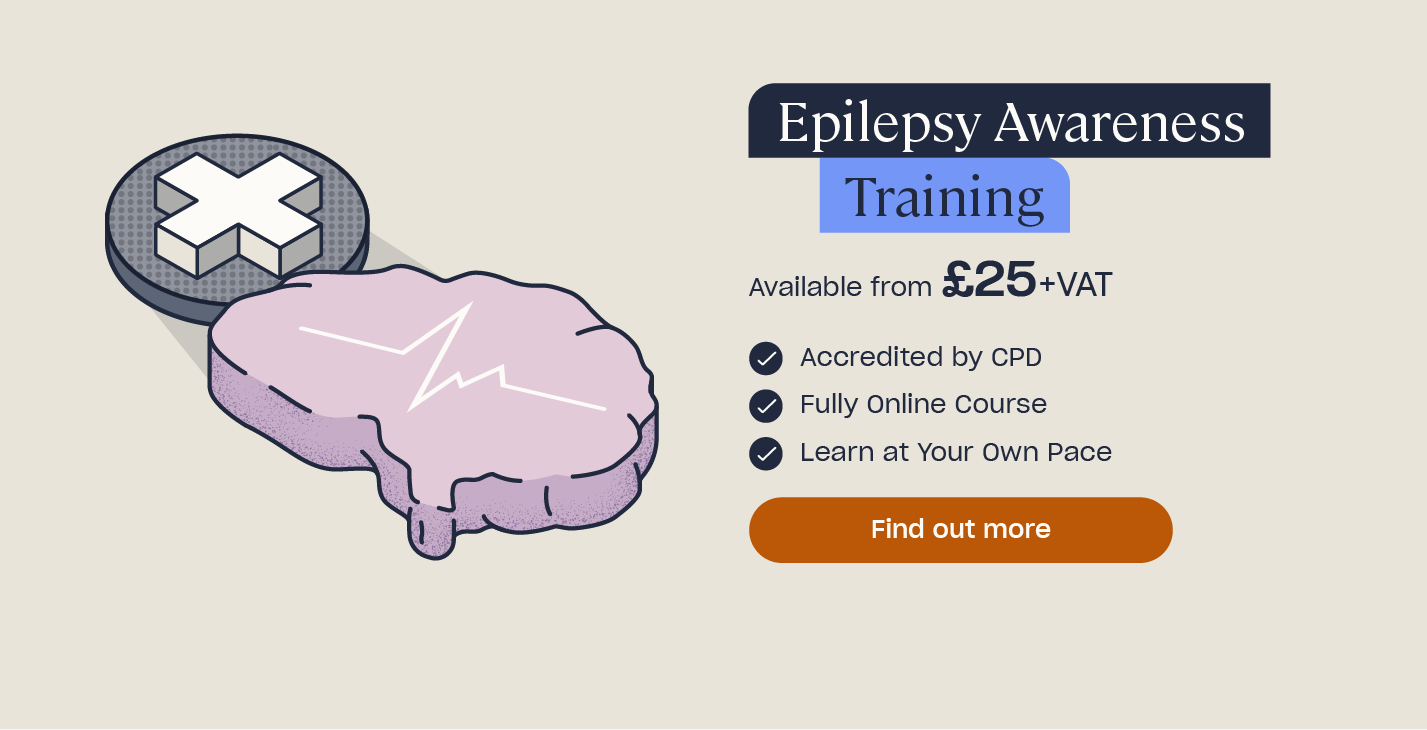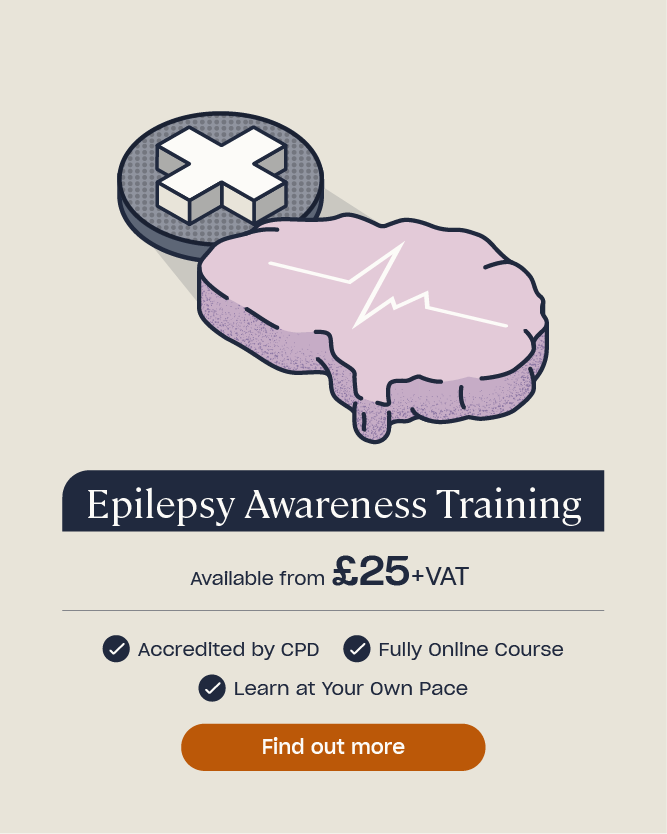What is Epilepsy?
Epilepsy affects millions of people worldwide, including those living with the condition and those who support or care for them. It is a common neurological condition that causes frequent seizures and can affect anyone, no matter their age, sex or race.
In this article we will outline what epilepsy is, the main differences between epilepsy and seizures, the signs and symptoms of a seizure, how you might help someone with epilepsy, and what to do in the event of a seizure.
What is Epilepsy?
Epilepsy is a common condition that affects the brain and can cause seizures. Seizures are bursts of electrical energy in the brain that can result in symptoms such as losing awareness, shaking or collapsing.
Epilepsy is a lifelong condition that usually starts in childhood or over the age of 60. With medication, epilepsy symptoms can be controlled and sometimes the condition can get better over time. But for many people epilepsy is a lifelong condition.

There are many different causes of epilepsy and they are different for each person. Some common causes include damage to the brain through a severe head injury, a stroke or a brain infection.
As well as different causes of epilepsy, there are different types. The International League Against Epilepsy (ILAE) identified four types of epilepsy, they include:
Focal epilepsy – these seizures begin on one side of the brain.
Generalised epilepsy – these seizures begin on both sides of the brain.
Combined general and focal epilepsy – this type of epilepsy includes both focal and generalised seizures.
Unknown if generalised or focal epilepsy – it is not always possible to determine the cause of these types of seizures.
What is the Difference Between Epilepsy and Seizures?
A seizure is a burst of electrical activity in the brain that can cause abnormalities in muscle tone, movements, behaviours, sensations and levels of consciousness. Seizures affect people in different ways depending on which part of the brain is involved. For example, it is common for people to fall to the ground during generalised seizures.

Seizures can have many causes such as high blood sugar, drug use, or a fever. If an individual has two or more seizures, at least 24 hours apart, it is generally considered to be epilepsy.
It is important to note that you can have a seizure without having epilepsy. As mentioned above, seizures can be triggered by different things and are not always caused by epilepsy. However, you can’t have epilepsy without experiencing seizures, even if they don’t cause obvious effects.
Another important differentiation is between causes of epilepsy and triggers of seizures. For example, someone with epilepsy may have a seizure because they are sleep deprived. Lack of sleep is the trigger of the seizure, but the cause of their epilepsy could be brain trauma. In this example, the lack of sleep hasn’t caused their epilepsy, just the seizure.
Some causes of epilepsy include:
- A brain infection.
- Genetics.
- A lack of oxygen during birth.
- Drug or alcohol misuse.
- A brain or head injury.
- A brain tumour.
- A stroke.
- Alzheimer’s disease.
Some triggers of seizures include:
- Missing medication.
- A fever, this is especially common in children.
- Changes in hormones.
- A lack of sleep.
- Flashing and flickering lights.
- Stress.
- Skipping or missing meals.
- Alcohol and recreational drugs.
- Over excitement.
Signs and Symptoms of Epileptic Seizures
The signs and symptoms that someone is having a seizure will differ depending on which type of seizure they are having. Furthermore, not all seizures involve unusual body movements or shaking and some seizures are only seconds long.

Some signs and symptoms that may indicate that someone is having an epileptic seizure, are:
- Rapid blinking.
- Appearing confused or in a daze.
- Breathing difficulties.
- A loss of consciousness.
- Losing muscle tone or dropping to the floor.
- Uncontrollable body movements, shaking or jerking.
- Changes in hearing, vision, taste, smell and feelings.
- Struggling to talk.
- An increased heart rate.
- Lip-smacking, chewing motions, or rubbing hands and fingers.
It is crucial that people are aware of the signs and symptoms that someone is having a seizure so they can spot it quickly and help if needed.
Seizures can be very serious, especially if they last for longer than five minutes or the person stops breathing. Seizures can also result in injuries such as bruises, scratches and head injuries, therefore it is useful to know how you can support someone with epilepsy when they have a seizure.
Looking to Learn More?
Our Epilepsy Awareness Training Course outlines the different responses to different types of seizures, how to recognise an emergency situation and how to support an individual after a seizure. It also contains downloadable resources to help with recording seizures and identifying potential triggers.
How to Help Someone with Epilepsy?
Epilepsy is unique to each individual, therefore, the type of support they require will vary. Only by understanding how a person is affected by the condition, can you offer them the most appropriate and effective help.

Responding to Seizures
If someone has a seizure, respond with the following:
Do:
- Move any nearby harmful objects out of the way.
- Stay calm, reassure them and stay with them until the seizure is over.
- After the seizure, ask them if they are okay and offer them somewhere to sit down.
Don’t:
- Restrain them, grab them or make any abrupt movements.
- Assume they are aware of what is happening.
- Try to bring them round or offer them any food or drink.
Call 999 or 112 if:
- You know it is their first seizure.
- The seizure continues for more than five minutes.
- The person is injured or you think they need medical attention.
- One seizure follows another without the individual regaining consciousness.
As mentioned, how you respond to a seizure depends on the type of seizure the individual is having. If you want to learn how to respond to each type of seizure, as well as how to recognise an emergency situation, take a look at our Epilepsy Course.
After a seizure, some people will recover immediately, whereas others may take minutes or even hours to recover. The recovery time after a seizure is referred to as the postictal state and during this time people can feel confused and tired. Being there for the person and staying with them until they come round is a helpful way to offer support.
One of the most important things you can do for a friend with epilepsy is to learn as much as you can about the condition and share as much as you can to help raise awareness. Epilepsy is much more complex than most people realise and every little bit of understanding helps all those affected.
Epilepsy is a common condition that affects the brain and can cause frequent seizures. There are many different causes of epilepsy including a stroke, brain damage or a head injury. Seizures can be emergency situations so it is important you know how to respond and support someone both during and after they have had a seizure.
Further Resources:
- How to Carry Out the Primary Survey Using the DRABC Steps
- First Aid Qualifications: The Difference Between FAW and EFAW
- Epilepsy Awareness Training







